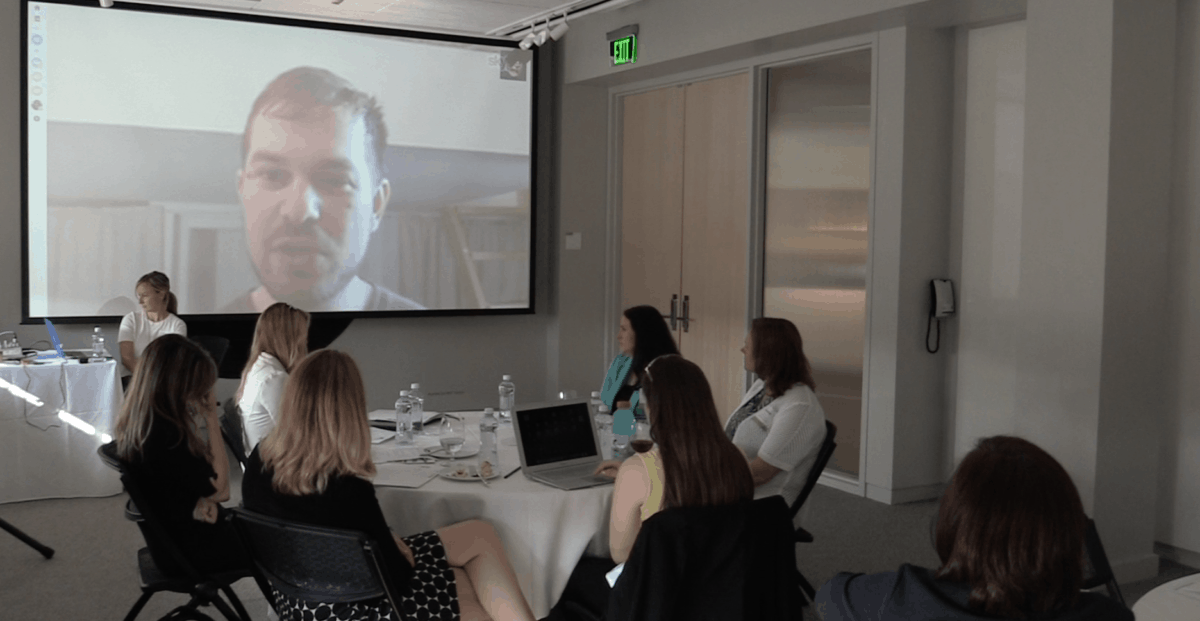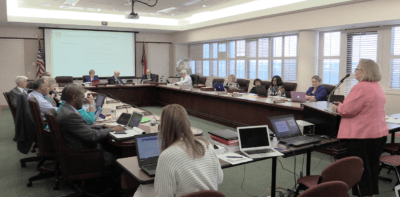In August, former Governor Bev Perdue, Rep. Craig Horn (R-Union), Getting Smart Director Tom Vander Ark, and a handful of others sat around a table in Durham on a videoconference with superintendents and educators across the state.
For months, the nonprofit organization digiLEARN, founded by Perdue, has been crafting a system that the organization’s leaders say puts teachers front and center as innovators in teaching and learning in North Carolina and across the country.
The program, on its face, is about just what its title spells out — digital learning. One of its main goals is to connect entrepreneurs and educators to bring innovation to the state’s schools. The opportunity technology in the classroom presents has called for an inevitable and powerful shift in education, but one that’s come with hurdles and hesitancies.
To get past those challenges — like having useful technology in the classroom with unequipped teachers or without an effective strategy — the digiLEARN team has done its research. The key, they say: Digital Scholars. In other words, from their presentation, “teachers who envision, inspire, model, and promote sharing of innovative instruction and quality learning.”
The meeting started with Vander Ark, who was the executive director for the Bill & Melinda Gates Foundation before diving head first into studying education. He was presenting the framework of the Digital Scholars program, which was developed by his team from Getting Smart in collaboration with the digiLEARN team, the cadre of Digital Scholars, and the Friday Institute for Education Innovation at North Carolina State University. The program was created after getting feedback from teachers in all the participating districts about the support they needed to make the transition to digital and personalized learning. The development team also met with entrepreneurs working in EdTech space to discuss ways in which the Digital Scholars and entrepreneurs could improve collaboration.
Vander Ark’s work has taken him across the country, stopping in 40 major cities where, in each, he cataloged innovation happening in schools. From that journey came the 2015 book, “Smart Cities that Work for Everyone.” Vander Ark shared that transforming the existing educational systems is a challenge. He said he noticed that innovation within education, unlike in the private sector, is slow-spreading.
“Real, fundamental innovation is really hard,” Vander Ark said.
Based on his research, there are three lessons that Vander Ark said his team used in helping architect the Digital Scholars program:
- Sustained leadership with a vision is crucial
- A combination of great teachers and great superintendents — a “top-down, bottom-up” model — is very effective
- A strong middle layer of technical assistance, funding, and research, is needed
The importance of the teacher’s perspective has been integrated into the design process from the beginning. From February to April, the digiLEARN team, with the help of The Friday Institute, surveyed all the teachers from each of the Digital Scholars’ districts and interviewed the first set of Digital Scholars, which includes two teachers in each of the 10 districts participating.
In May and June, they met with the Scholars to draft and revise the model. Then, in July and August, the Scholars reviewed the model again before it was submitted for funding.
One of those Scholars was Danielle Faggioli. She teaches Math I, Math III, and Pre-Calculus at Granville Early College High School in Creedmoor. She says one of the most important things about using technology is knowing when not to use it.
“You can’t just use technology to use it,” she said. “You have to use it in a meaningful way.”
She says she tries to remind other teachers that technology is meant to make things easier. If something is easier and effective without technology, then don’t use it.
She became a Digital Scholar after she and another Granville County teacher, Christopher Leas of Stovall-Shaw Elementary School, won innovative educator awards in their district. The district’s technology facilitator decided they would be good candidates for the digiLEARN Digital Scholars program.
“I’m a big proponent of increasing and using technology in the classroom,” Leas said. “So any time I can get together with a bunch of teachers that are like minded, I love it.”
The two-year model of the Digital Scholars program starts with an “innovation learning institute” — a kick-off event for the Digital Scholars on what innovation in education is all about.
Next, Scholars go through training and observation to build their knowledge and skills around technology, next-generation learning, and teaching other teachers. The Scholars will also go on field trips to visit other schools across the country to witness innovative teaching and learning.
Vander Ark highlighted the value of visiting other schools.
“The chance for these teachers, some of whom have worked in the same location their entire careers, to get out and experience a different learning environment in a different context is such an important gift,” he said.
“You can read about these things and you can watch a video but there’s just nothing short of visiting another place and experiencing what the culture is like and watching how people interact with each other.”
The Scholars will work with entrepreneurs to design school projects through long-term “innovation design teams.” The goal is that entrepreneurs will better understand the realities of schools and their needs. Teachers are the experts in teaching and learning while the entrepreneurs are the developers. There will also be “innovation learning camps” — one-to two-day events in the summer that further build partnerships between students, teachers, and entrepreneurs.
In 2017, digiLEARN hopes to identify 20 more Scholars. The program is operating on a $1.5 million budget, $900,000 of which will be for the 40 total Scholars training, travel, and experiences. The other $600,000 will be used to hire a full-time Digital Scholar, and for contracts, publications, and other expenses.
Myra Best, executive director of digiLEARN, said the blend of individual and collaborative experiences is about supporting each teacher and district.
“(The program) is based on what their personal needs are, what they need to do to improve their own skills professionally, and then how they can help support other teachers in their own districts,” Best said.
Solving the disconnect between teachers and the entrepreneurial community, Perdue said, is the missing piece in the future of education.
“We have realized now that if you can put teachers really skilled in digital learning in every school in a state, or in every school in a district, then you can build to scale this thing we call personalized learning,” she said.
“At the end of the day, that’s what going to drive the 21st century workforce.”



